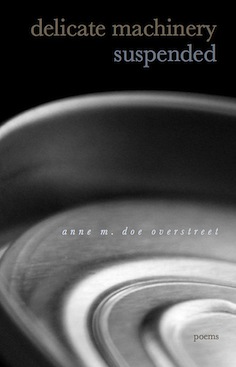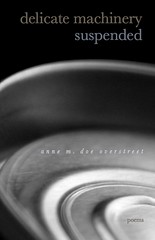You live a life, or perhaps you’ve lived half your life, according to the mortality statistics. To understand the second half, you must first understand the first. To do that, you turn to a variety of tools: memory, questioning, affection and gratitude, love and faith, consideration of jobs held and work done, playfulness and keen, honest, detailed observation.
If you’re poet Anne Overstreet, you do these things and you create Delicate Machinery Suspended: Poems, poetry about a life observed, but also about the life to come. And it is a beautiful collection indeed.
Consider the sorting of a deceased relative’s household, from “Day of the Dead:”
I leave my husband there in Maricopa at one with its bank,
one diner, one gas station, to sort through the almost empty
house that I can’t bear to face. We’ll take what we can use
and forsake the hollow egg collection, a leather glove that
needed a running stitch to close a rent. There’s a lacquered box
one of her nieces made, quite ugly, mouth framed by stiffened
Sargent series brushes (No. 8). A mobile of red-crested cranes
eddies and tinks like a quartet of tuneless pianos. Soon we’ll be
six states away from where we last broke bread with her…
Is this what life comes down to, the poet seems to ask: an almost empty house, a hollow egg collection, an ugly lacquered box and a mobile? In the second part of the poem, the poet escapes into nature but doesn’t find the needed contrast:
Down the road a few miles I pull off and pace the trickle
they call a river around here, fading into the ground
in posts like train song. In the language of leaving
there is no returning migration of snow geese,
the peregrination of a red hawk turns
only clockwise, and marigolds come into their own
only on the day of the dead; there is no other color like theirs.
My eye thinks chromium yellow. But, perhaps not.
In the grebe’s nest among the river-reed bower, in the shroud
of the snake skin tossed to the side like a T-short at bedtime,
the abandoned speak their half-shaped language,
the life gone out of them as it always does.
The scene shifts, but the reality, in all of its intricate detail, remains startlingly similar. The empty house with its remnants of a life lived, and the “trickle they call a river around here” both suggest much about our mortality. Overstreet observes with the camera’s eye, capturing detail and nuance like filmmaking close-ups, a technique she uses in poems like “If It Doesn’t Rain Soon” as well, where her eye shifts from a man walking along a street to traffic passing a lounge and a video store, a woman sitting in a lawn chair, a snapshot of activity at a fire station, and a neighbor sitting at a kitchen table, and through each scene the suggestion of heat, humidity and needed rain. It’s an arresting approach, this camera eye moving quickly, capturing the sense of what this moment is like, assimilating and understanding.
This close and careful observation can be seen throughout the volume’s poems. Here is the description of a “Rental, ” (which took me back almost four decades to my first apartment in an old building):
Dust sifts through the floorboard
gaps, settles along a lintel
that has begun to pull back
from the doorway. Everything
that could be done on the cheap,
by hand, is letting go,
having done enough and more.
Old glass warps and blurs the street
into a torrent of chrome. We’ve learned
to listen to what the stairs say,
for water in the walls, for mice.
This house eases and groans
under a roof that keeps the two of us,
the cat, and a view of the cedar
flexing and stretching in the wind
for as long as its roots hold.
We can afford agreement
of nail and plaster and wood
to hold, for now, together.
This is a home in an old building, of course, but it is also more –it is a life, a family and relationships, holding together by agreement and observation. Here, as in many of Overstreet’s poems, one also finds a subtle affection and even gratitude for the people who have helped create this life the poet knows.
The poems can be simultaneously playful and serious, as when they do a slight retelling of the “Little Red Riding Hood” fairy tale, in “Sleeping in Grandmother Wolfe’s House” and “Red #9.” You smile as you read them, and then the smile gives way to serious consideration. Overstreet is not simply retelling a fairy tale; she is considering what fairy tales mean in dream-like renderings.
This same playful-yet-serious sense of life is seen in one of the most beautiful poems of the collection, “Soufflé, ” which begins as a description of the preparation of a soufflé but becomes an incredible love poem.
This collection, Overstreet’s first, displays a command of language, style and content that is deeply affecting. You are watching a series of scenes filmed with the eye of an artist. And what she paints in Delicate Machinery Suspended of her life observed is a beautiful and wondrous thing.
___
Would you like to share Anne’s book in your sidebar? Grab a button…
- Longfellow’s “Paul Revere’s Ride”: Creating a National Legend - April 17, 2025
- Poets and Poems: Katie Kalisz and “Flu Season” - April 15, 2025
- Poets and Poems: Michelle Ortega and “When You Ask Me, Why Paris?” - April 10, 2025


Maureen Doallas says
Still waiting for my copy to arrive. I’ve been looking forward to reading Anne’s collection.
L. L. Barkat says
I like what you say about the tension of the poems: serious and playful at the same time. Not easy to achieve. And something I absolutely love in poetry.